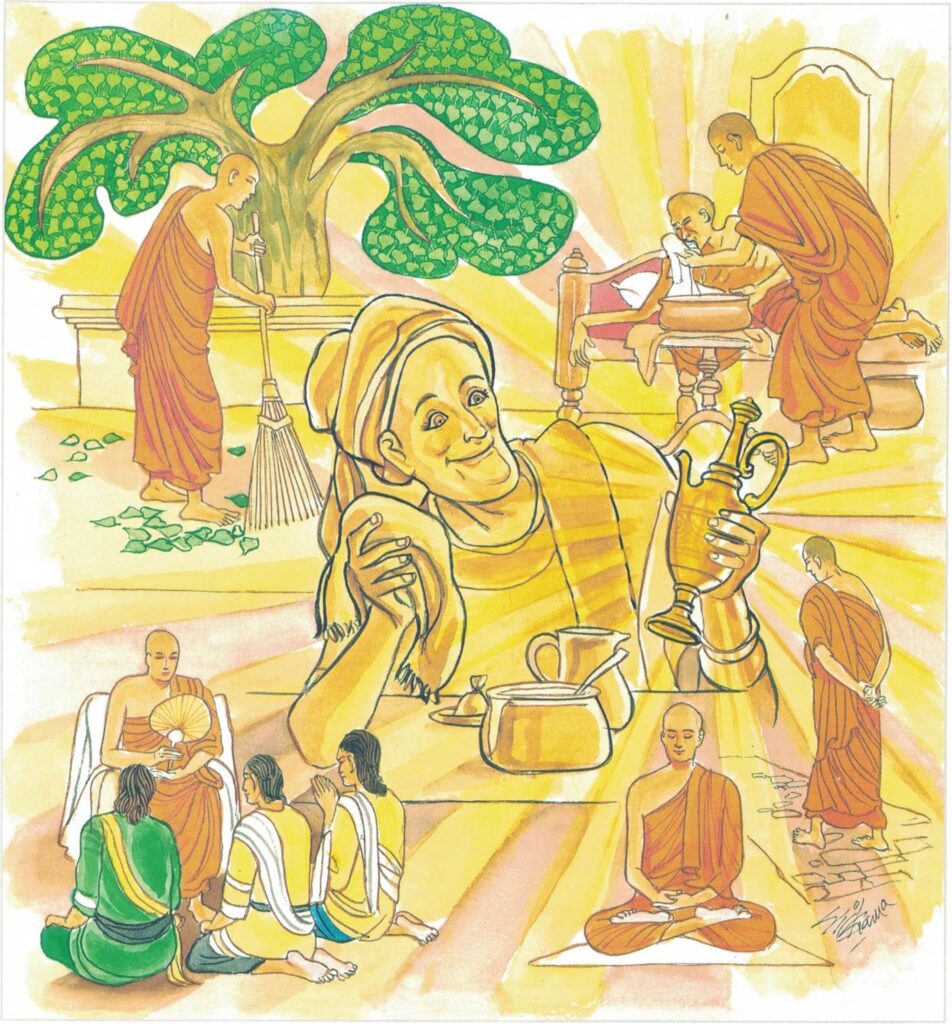Pali text, illustration and English translation of Dhammapada verse 239:
anupubbena medhāvī thokathokaṃ khaṇe khaṇe |
kammāro rajatasseva niddhame malamattano || 239 ||
239. Little by little, time after time, successively then let the sage blow away all blemishes just as a smith with silver.

The Story of a Brāhmin
While residing at the Jetavana Monastery, the Buddha spoke this verse with reference to a brāhmin.
The story goes that early one morning this brāhmin went out of the city, stopped at the place where the monks put on their robes, and stood and watched them as they put on their robes. Now this place was thickly overgrown with grass. As one of the monks put on his robe, the skirt of the robe dragged through the grass and became wet with drops of dew. Thought the brāhmin, “The grass should be cleared away from this place.” So on the following day he took his mattock, went thither, cleared the place, and made it as clean and smooth as a threshing-floor. The day after, he went to that place again. As the monks put on their robes, he observed that the skirt of the robe of one of the monks dropped to the ground and dragged in the dust. Thought the brāhmin, “Sand should be sprinkled here.” So he brought sand and sprinkled it on the ground.
Now one day, before breakfast, the heat was intense. On this occasion he noticed that as the monks put on their robes, sweat poured from their bodies. Thought the brāhmin, “Here I ought to cause a pavilion to be erected.” Accordingly he caused a pavilion to be erected. Again, one day early in the morning, it rained. On this occasion also, as the brāhmin watched the monks, he noticed that their robes were wetted by the drops of rain. Thought the brāhmin; “Here I ought to cause a hall to be erected.” So there he caused a hall to be erected. When the hall was finished, he thought to himself, “Now I will hold a festival in honour of the completion of the hall.” Accordingly he invited the congregation of monks presided over by the Buddha, seated the monks within and without the hall, and gave alms.
At the conclusion of the meal he took the Buddha’s bowl to permit him to pronounce the words of thanksgiving. “Venerable,” said he, “as I stood in this place when the monks were putting on their robes and watched them, I saw this and that, and I did this and that.” And beginning at the beginning, he told the Buddha the whole story. The Buddha listened to his words and then said, “Brāhmin, a wise man by doing good works, time after time, little by little, gradually removes the stains of his own evil deeds.”
Explanatory Translation (Verse 239)
medhāvi anupubbena khaṇe khaṇe thokathokaṃ
rajatassa kammāro iva attano malaṃ niddhame
medhāvi: the wise persons; anupubbena: gradually; khaṇe khaṇe: every moment; thokathokaṃ [thokathoka]: little by little; rajatassa: of silver; kammāro iva: like the smith; attano malaṃ [mala]: one’s own blemishes; niddhame: cleanse
Wise persons, moment after moment, little by little, remove the blemishes from their own selves, just like smiths removing blemishes from silver.
Commentary and exegetical material (Verse 239)
Malaṃ: stain, blemish, taint. Usually, these are referred to as kilesas. Kilesa, defilements, are mind-defiling, unwholesome qualities. There are ten defilements, thus called because they are themselves defiled, and because they defile the mental factors associated with them.
They are:
- Greed (lobha);
- Hate (dosa);
- Delusion (moha);
- Conceit (māna);
- Speculative views (diṭṭhi);
- Skeptical doubt (vicikicchā);
- Mental torpor (thīna);
- Restlessness (uddhacca);
- Shamelessness (ahirika);
- Lack of moral dread or conscientiousness (anottappa).